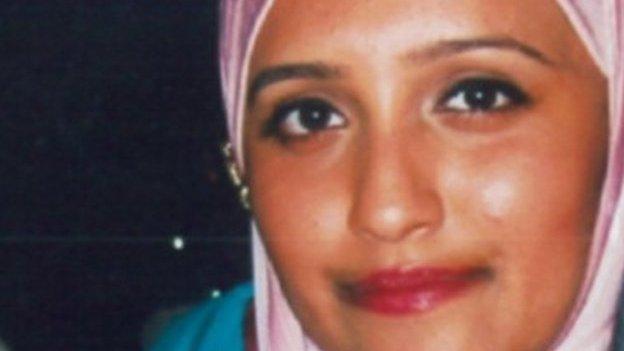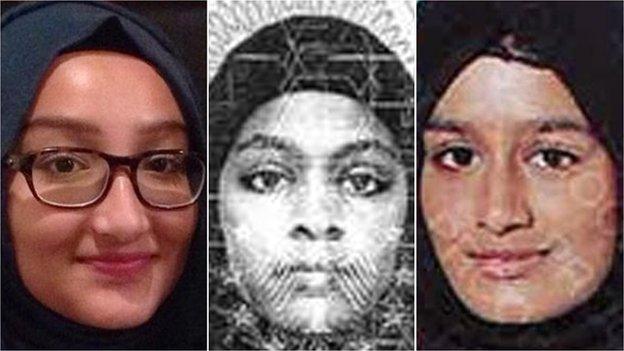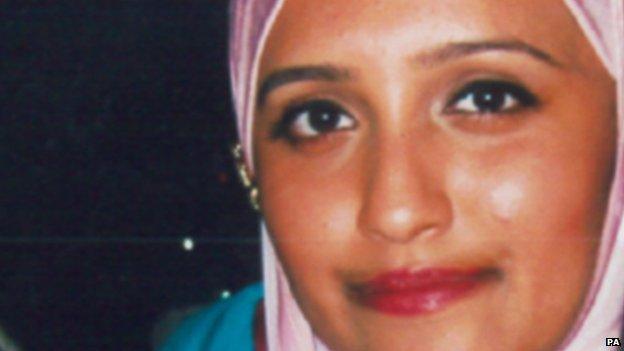UK security services 'failed' over Syria girls
- Published
One of the schoolgirls sent a message to 'jihadi bride' Aqsa Mahmood on social media last Sunday, as Caroline Hawley reports
The family of a Glasgow woman who may have encouraged three London girls to join Islamic State say officials "failed" to stop them leaving the UK.
Aqsa Mahmood, 20, who went to Syria to be a "jihadi bride" in 2013, reportedly had online contact with one of the girls who flew to Turkey last week.
It is feared that Kadiza Sultana, 16, and Shamima Begum and Amira Abase, 15, may try to join extremists in Syria.
Scotland Yard said it would not discuss matters of surveillance and security.
'Evil distortion'
In a statement, Ms Mahmood's family said she was a "disgrace" to the family and that it was "full of horror and anger" that she "may have had a role to play" in recruiting the girls for Islamic State (IS).
"However, the security services have serious questions to answer," the family added.
"Aqsa's social media has been monitored since she disappeared over a year ago, yet despite alleged contact between the girls and Aqsa, they failed to stop them from leaving the UK to Turkey, a staging post for Syria."
Ms Mahmood, who moved from Glasgow to Syria to marry an IS fighter, uses a Twitter account to encourage British women to join her in Syria and last Sunday, Shamima sent her a message via Twitter.
Lawyer for 'jihadi bride' family: "You would expect the authorities to knock on the door and say your child might need help"
The Mahmoud family statement said despite UK government "rhetoric" about IS, authorities had not taken "basic steps to stop children leaving" to join the militants.
Their lawyer Aamer Anwar told BBC Breakfast that they wanted to know how the girls could have been allowed to travel to Turkey alone.
He added: "They are deeply distressed and angry. They are thinking: 'How many other families is this happening to?'"

Aqsa Mahmood has been in Syria for more than a year
Kadiza, Shamima and Amira, who all attended Bethnal Green Academy in east London, flew from Gatwick to Turkey after telling their parents they were going out for the day.
It is not clear whether the London girls - all "star GCSE pupils" - have crossed from Turkey into Syria.
Police said they had been interviewed after another girl from their school went to Syria in December, but nothing had indicated they were at risk.
The girls' families have all made public pleas for them to return home.
'Big responsibility'
Speaking on the Andrew Marr Show, Leader of the House of Commons and ex-Foreign Secretary William Hague said that "more has to be done by all of us" to stop vulnerable youngsters from being radicalised.
When asked if he thought parents should take away their children's passports if they are worried about them being radicalised, he said: "It's entirely open to parents to do that. Parents and families have a big responsibility.
"I think that the families who have spoken out have said that this is not what Islam is about and that it is a disgrace to their family."
He added: "There's been a lot of criticism over the last year of the government doing too much surveillance and it's been difficult to get agreement on powers to update the government's powers to intercept communications. This can be an example of why it is necessary to be able to do that in some cases."
Daniel Sandford reports on the appeals from relatives for the girls to come home
Shadow business secretary Chuka Umunna told Pienaar's Politics on BBC Radio 5 Live that schools could play more of a role in helping children and teenagers understand what was happening in the world.
The Labour MP said: "I think the more you are taught in school about current and world affairs the better.
"I left education a long time ago but I don't think I had nearly enough teaching on broad world and current affairs.
"But I really do think this is not just an issue for the intelligence services, it's for all of us in our schools, in our communities, in our families to tackle this."
Justice Minister Simon Hughes told Murnaghan on Sky News it was important to ensure a counter-argument against extremism was being made in schools and also to show pupils "that's not where excitement and success should lie".
Ex-Foreign Office minister Baroness Warsi, who resigned from the government over its policy on Gaza, told the same programme: "It's becoming more and more apparent that people are not being radicalised in places of worship but actually being radicalised in their own bedrooms by being on the internet.
"Much research has gone into making sure that websites are taken down but we are fighting an ever-losing battle with extremist groups. One thing IS has been extremely successful at has been using the internet and social network spaces for their propaganda."
- Published21 February 2015

- Published21 February 2015

- Published21 February 2015

- Published6 October 2014

- Published20 February 2015

- Published28 January 2015
